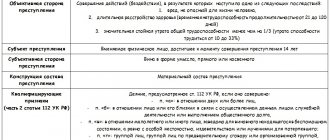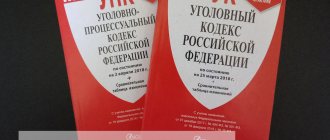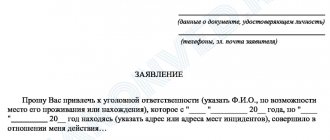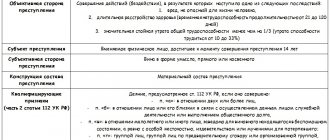1. Intentional infliction of slight harm to health, causing short-term health disorder or minor permanent loss of general ability to work, -
shall be punishable by a fine in the amount of up to forty thousand rubles, or in the amount of the wages or other income of the convicted person for a period of up to three months, or by compulsory labor for a term of up to four hundred eighty hours, or by corrective labor for a term of up to one year, or by arrest for a term of up to four months.
2. The same act committed:
a) for hooligan reasons;
b) for reasons of political, ideological, racial, national or religious hatred or enmity, or for reasons of hatred or enmity towards any social group;
c) using weapons or objects used as weapons;
d) in relation to a person or his relatives in connection with the performance of official activities by this person or the performance of public duty, -
shall be punishable by compulsory labor for a term of up to three hundred sixty hours, or correctional labor for a term of up to one year, or restriction of liberty for a term of up to two years, or forced labor for a term of up to two years, or arrest for a term of up to six months, or imprisonment for a term of up to two years.
- Article 114. Causing grievous or moderate harm to health by exceeding the limits of necessary defense or by exceeding the measures necessary to detain a person who has committed a crime
- Article 116. Beatings
Commentary to Art. 115 of the Criminal Code of the Russian Federation
The signs of the object and the victim as part of the intentional infliction of minor harm to health are identical to the above-discussed signs of the object of the main structure of causing serious harm to health (see commentary to Article 111 of the Criminal Code of the Russian Federation).
The objective side consists of the act in the form of action or inaction and the causally associated consequences in the form of minor harm to health.
Harm to health is considered minor if two signs are present:
a) if it causes a short-term health disorder lasting no more than twenty-one days, or
b) entails a slight permanent loss of general ability to work in an amount not exceeding ten percent.
Practice recognizes as minor harm to health: weakened vision or hearing, loss of one finger on the hand (except for the index and thumb), impaired grasping ability of the left wrist, etc.
Causing harm to health that had immediate consequences, was accompanied by health problems for less than six days and did not lead to minor loss of ability to work (for example, multiple abrasions, bruises, small superficial wounds) may be qualified under Art. Art. 116, 117 of the Criminal Code of the Russian Federation.
Minor harm to health may be an element of the objective side of another crime (for example, robbery, rape, etc.), in this case it does not receive an independent legal assessment. Likewise, the infliction of minor harm does not require independent qualification if, along with it, in the process of using violence, the victim was inflicted with harm of a different degree of severity.
The subjective side of the crime is characterized by guilt in the form of direct or indirect intent. A person is aware of the public danger of causing minor harm to health, foresees the possibility or inevitability of the consequences and desires (with direct intent) or consciously allows or is indifferent to the fact of causing minor harm to health (with indirect intent). The motives and purposes of the crime (except for those specified in Part 2 of Article 115 of the Criminal Code of the Russian Federation) do not affect the qualifications of the crime.
When qualifying an act, the content and direction of the intent of the perpetrator must be accurately established. If the perpetrator had the intention to cause more serious harm to health or death to the victim, but the desired consequences did not occur due to circumstances beyond his control and the victim was actually caused minor harm to health, the act is qualified in accordance with the direction of intent as an attempt to commit a more serious crime.
Careless infliction of minor bodily harm does not entail criminal liability.
The general subject of the crime is a physically sane person who has reached the age of sixteen.
The qualifying signs of intentional infliction of minor harm to health (Part 2 of Article 115 of the Criminal Code of the Russian Federation) are similar to the corresponding signs of murder discussed above (see commentary to Article 105 of the Criminal Code of the Russian Federation).
What are the criteria for permanent facial disfigurement? Who defines them?
Lawyer Ivlev Sergey Sergeevich
Call now and get a preliminary consultation:
8-912-351-26-42 8
In accordance with Part 1 of Art. 111 of the Criminal Code of the Russian Federation provides for criminal liability, including for the intentional infliction of grievous bodily harm, expressed in permanent disfigurement of the face.
According to the meaning of the law, indelible disfigurement of the face, as one of the dispositive signs of Part 1 of Art. 111 of the Criminal Code of the Russian Federation, includes two mandatory criteria: medical, which is expressed in the indelibility of the traces of violence left on the face, and aesthetic, based on an assessment of the changes that have occurred in the appearance of the victim in comparison with his previous appearance and generally accepted ideas about how looks like a human face.
A face is considered to be indelibly disfigured if the damage is not only irreparable by conventional surgery, but also gives the face a repulsive, deformed, ugly appearance.
Harm caused to human health is determined depending on the degree of its severity (serious harm, moderate harm and light harm) on the basis of the qualifying criteria provided for in clause 4 of the Rules for determining the severity of harm caused to human health, approved by the Decree of the Government of the Russian Federation dated 17.08 .2007 No. 522, and in accordance with medical criteria for determining the severity of harm caused to human health, approved by the Ministry of Health and Social Development of the Russian Federation.
According to clause 6.10 of the Medical criteria for determining the severity of harm caused to human health, approved by order of the Ministry of Health and Social Development of the Russian Federation dated April 24, 2008 No. 194n, indelible changes mean those injuries to the face that do not disappear on their own over time (without surgical removal of scars , deformations, facial expression disorders, etc., or under the influence of non-surgical methods) and their elimination requires surgical intervention (for example, cosmetic surgery).
The current legislation does not establish criteria (signs) of such concepts as “beauty”, “ugliness” in relation to a person’s face, therefore the concept of “disfigurement” refers not to medicine, but to aesthetics and is of an individually determined and evaluative nature.
This legal position is confirmed by judicial practice.
Thus, according to the Decision of the Supreme Court of the Russian Federation dated August 17, 2016 No. AKPI16-562 “... the issue of disfigurement of a person’s face, being legal and evaluative, must be resolved by the court based on generally accepted aesthetic ideas about the beauty and attractiveness of the human face, taking into account all the circumstances of the case, in including the opinions of the victim and other participants in criminal proceedings, with the exception of a doctor - a forensic medical expert, whose conclusion is limited only to establishing the indelibility of the damage caused...”
Facial disfigurement is a purely evaluative category and the final conclusion on this issue is made by the court, not with reference to a medical report alone on the indelibility of traces of damage, but on the basis of a comprehensive study of the evidence collected in the case, in particular, a comparative analysis of data on the appearance of the victim before and after causing him bodily harm in the facial area.
Thus, it is the court that has the right to determine the severity of the harm caused to a person’s health, expressed in the indelible disfigurement of his face.
Attention! The information provided in the article is current at the time of publication.
Judicial practice under Article 115 of the Criminal Code of the Russian Federation
Ruling of the Supreme Court of the Russian Federation dated February 21, 2017 N 5-UD17-9
By the verdict of the Tushinsky District Court of Moscow dated May 12, 2009, I. (previously convicted) was convicted: under Part 1 of Art. 115 of the Criminal Code of the Russian Federation - to six months of correctional labor with the withholding of 10% of wages to the state; according to paragraphs “b”, “c”, part 2 of Art. 131 of the Criminal Code of the Russian Federation - to five years in prison; according to paragraphs “b”, “c”, part 2 of Art. 132 of the Criminal Code of the Russian Federation - to five years in prison. Based on Part 3 of Art. and clause “c” of Part 1 of Art. According to the Criminal Code of the Russian Federation, for the totality of crimes, by partial addition of punishments, I. was finally sentenced to seven years in prison.
Resolution of the Presidium of the Supreme Court of the Russian Federation dated March 14, 2018 N 306P17
Abdurakhmonov Saidmurod Bekovich, ... convicted on January 20, 2010 under clause “d”, part 2 of art. 161, part 1 art. 161, part 1 art. 115 of the Criminal Code of the Russian Federation to 2 years 6 months in prison, released on July 18, 2011 after serving his sentence, was detained on August 16, 2012 in accordance with Art. Art. 91, 92 of the Code of Criminal Procedure of the Russian Federation on suspicion of committing a crime under paragraph “b” of Part 4 of Art. 132 of the Criminal Code of the Russian Federation.
Resolution of the Presidium of the Supreme Court of the Russian Federation dated 06.06.2018 N 60P18
Ionov was acquitted: under Part 1 of Art. 210, according to Part 2 of Art. 213, paragraphs “g”, “e”, part 2 of Art. 112 of the Criminal Code of the Russian Federation (on charges of committing crimes against the victims of G.V.T.K. under “a” part 3 of Article 163 of the Criminal Code of the Russian Federation (on charges of committing a crime against M.) under paragraph “a” part 2 of Article 115 of the Criminal Code of the Russian Federation (on charges of committing a crime against N.) under paragraph “a” of Part 2 of Article 116 of the Criminal Code of the Russian Federation (on charges of committing a crime against Ya. on October 29, 2013), on clause "a" part 3 of article 111 of the Criminal Code of the Russian Federation (on charges of committing a crime against K.) under part 2 of article 213, clause "a" part 2 of article 115 of the Criminal Code of the Russian Federation (on charges of committing crimes against T.) on the basis of clause 2, part 1, article 24 of the Code of Criminal Procedure of the Russian Federation, clause 3, part 2, article 302 of the Code of Criminal Procedure of the Russian Federation due to the lack of corpus delicti, he is recognized as having the right to rehabilitation (with the exception of acquittal under Part 1 Article 210 of the Criminal Code of the Russian Federation).
Appeal ruling of the Judicial Collegium for Criminal Cases of the Supreme Court of the Russian Federation dated 06.06.2018 N 44-APU18-8sp
Convict Apet asks to reclassify her actions to clause “c” of Part 2 of Art. 115 of the Criminal Code of the Russian Federation or reduce the punishment to the minimum under the sanction of Part 2 of Art. 105 of the Criminal Code of the Russian Federation; notes that she caused a wound to the victim, which qualifies as minor harm to health, and was not involved in causing other bodily injuries;
Appeal ruling of the Judicial Collegium for Criminal Cases of the Supreme Court of the Russian Federation dated June 27, 2018 N 53-APU18-7
clause "c" part 2 art. 115 of the Criminal Code of the Russian Federation to 1 year of imprisonment, on the basis of Part 2 of Art. The Criminal Code of the Russian Federation for the totality of crimes by partial addition of punishments imposed 8 years and 1 month of imprisonment to be served in a high-security correctional colony.
Appeal ruling of the Judicial Collegium for Criminal Cases of the Supreme Court of the Russian Federation dated June 27, 2018 N 59-APU18-4
sentenced to imprisonment: - under paragraph “c” of part 2 of article 115 of the Criminal Code of the Russian Federation for 8 months; - under paragraph “g” of Part 2 of Article 105 of the Criminal Code of the Russian Federation for 17 years; - under paragraph “d” of part 2 of article 158 of the Criminal Code of the Russian Federation for 2 years.
Appeal ruling of the Judicial Collegium for Criminal Cases of the Supreme Court of the Russian Federation dated July 26, 2018 N 30-APU18-3
Regarding the traces of D.’s blood found on the clothes of deceased A. and the arguments of Z.B. Batchaev. that D. strangled A., these issues were also carefully checked during the preliminary investigation, and on June 3, 2017, a decision was made to terminate the criminal prosecution of D. under Part 1 of Art. 115 of the Criminal Code of the Russian Federation for the expiration of the statute of limitations (vol. 9, pp. 124 - 127), with which the court of first instance agreed, refusing the petition of the representative of the victims A. to return the criminal case to the prosecutor on these grounds (vol. 12, pp. 143).
Appeal ruling of the Judicial Collegium for Criminal Cases of the Supreme Court of the Russian Federation dated August 14, 2018 N 72-APU18-11
Convicted under paragraph “g” of Part 2 of Art. 105 of the Criminal Code of the Russian Federation to 16 years in prison with restriction of freedom for one year, under paragraph “c” of Part 2 of Art. 115 of the Criminal Code of the Russian Federation to one year in prison. In accordance with Part 3 of Art. The Criminal Code of the Russian Federation for the totality of crimes by partial addition of punishments imposed 16 years and 6 months of imprisonment with restriction of freedom for one year.
Appeal ruling of the Judicial Collegium for Criminal Cases of the Supreme Court of the Russian Federation dated August 30, 2018 N 11-APU18-12
actions of Arzamasov A.I. in relation to Ya. under paragraph “a” of Part 2 of Art. 116 of the Criminal Code of the Russian Federation as beating that caused physical pain, but did not entail the consequences specified in Art. 115 of the Criminal Code of the Russian Federation, in relation to L. under clause “a”, part 2 of Art. 115 of the Criminal Code of the Russian Federation as intentional infliction of minor harm to health;
Cassation ruling of the Judicial Collegium for Criminal Cases of the Supreme Court of the Russian Federation dated August 30, 2018 N 13-UD18-9
Alekseev Alexander Sergeevich, ... convicted: 1) July 8, 2013 under clause “a”, part 2 of art. 213, paragraph “a”, part 2, art. 116 of the Criminal Code of the Russian Federation to 2 years of suspended imprisonment with a probationary period of 1 year; On June 9, 2014, released from punishment under paragraph “a” of Part 1 of Art. 213 of the Criminal Code of the Russian Federation on the basis of an amnesty act, finally assigned under paragraph “a” of Part 2 of Art. 116 of the Criminal Code of the Russian Federation, punishment in the form of 6 months of correctional labor, suspended with a probationary period of 1 year; 2) October 3, 2014 under clause “a”, part 2 of art. 115 of the Criminal Code of the Russian Federation to 6 months of correctional labor with the deduction of 10% of earnings to the state income monthly;
Appeal ruling of the Judicial Collegium for Criminal Cases of the Supreme Court of the Russian Federation dated September 4, 2018 N 44-APU18-11
Convicted under paragraph “a” of Part 2 of Art. 105 of the Criminal Code of the Russian Federation to imprisonment for a term of 18 years, with restriction of freedom for 1 year, under paragraph “c” of Part 2 of Art. 115 of the Criminal Code of the Russian Federation to corrective labor for a period of 9 months with the deduction of 10% of wages monthly to the state income.
Legal basis for compensation for damage to health caused by a crime
The main issues relating to compensation for harm caused by damage to health are regulated by the Civil Code of the Russian Federation.
According to Art. 1085 of the Civil Code of the Russian Federation, when a citizen is injured or otherwise damaged his health, the victim’s lost earnings (income) that he had or could definitely have, as well as additional expenses incurred due to damage to health, including expenses for treatment, additional food, purchase of medicines, prosthetics, outside care, sanatorium treatment, purchase of special vehicles, preparation for another profession, if it is established that the victim needs these types of help and care and is not entitled to receive them free of charge.
Compensation for material and moral damage from a crime is also regulated by the civil legislation of the Russian Federation.




